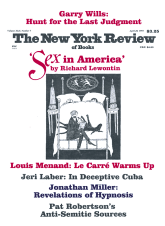“Ron [his coach] once told me that I dove with more pain and suffering and sickness than any diver he had ever had.”
—Greg Louganis
The Almighty is presumed to pass His judgments and dole out His penalties to individuals, which allows us to suppose that nations are spared painful sessions with the Recording Angel. But if ours is ever so summoned, we may suppose that the inquiry into its cardinal sins might begin with the question: “And why, America, did you, in your arrogance, teach so many of your children to hate themselves?”
To read Greg Louganis’s autobiography is to feel the chords of that question rising and falling until it throbs in the memory as lastingly as the sight of him seven years ago next August when he stood on the platform for his final Olympic dive. He was three points behind Xiong Ni of China. The stitches were still in his scalp he had struck on the springboard five days before. His wrist was taped for a bone cyst; his shoulder required pain-killing treatments twice a day; and his sinusitis had kept him awake from dark to dawn.
And then he dove, and won his fourth Olympic medal by just 1.14 points, and sobbed in his coach’s arms, weeping intimately in his fragility while all the rest of us were glorying vicariously in his toughness. While we were seeing only his heroism, he was feeling mostly his shame. “The whole thing was very bittersweet.”
He went back to Los Angeles with no goal ahead more pressing than to “work on rebuilding my relationship with Tom.” Tom had been Greg Louganis’s lover for four years that compounded the sufferings of a bad marriage with the afflictions of a crooked agent. Once Tom had held a knife to Greg’s throat and raped him. When they saw each other again, Tom acted “as if it had never happened.”
I didn’t expect him to apologize, because I thought I was the one who was in the wrong… I took full responsibility for what had happened and told myself that as long as I was good, it would never happen again.
A nature otherwise skimpy with talents had endowed Tom with a singular capacity for persuading Greg that whatever was done to him was his own fault. It is a crude skill at best, and in this instance required no refinements because life had already trained Greg to abjection long before they met. In the fourth grade,
I got beat up often enough that it seemed like a lot to me…I always thought that right prevailed, so since I got my butt kicked…it had to be true that…I must be a bad person. Since I was bad person, I must deserve it.
He had been sneered at as a “sissy” and “faggot” a while before he found out that these were terms for homosexuals. He knew “immediately that it was something to be ashamed of.” He was sixteen when he had his first congress with a man, felt “guilty and ashamed,” and expected that “over time I’d feel less ashamed…but it only got worse.” When he had made himself the greatest diver in the world, the rumors that he was gay set off such loathings in jealous teammates and fears in timid ones that none of them would room with him.
After testing HIV-positive and into the 1988 Olympic trials, “I started being haunted by the feeling that somehow I deserved AIDS. I was a faggot and this was the faggot’s punishment…. So it just followed that God was punishing me for acting on my feelings.”
The godly, if such Pat Robertson remotely is, didn’t have to tell a lot of Louganises that God had scourged them for their vices. The godless had already drummed that self-hating gospel so deep in Greg Louganis that, when he had stood alone and done a deed that would make proud the bravest of the brave, he was left still convinced he was worthless. He would carry that curse until these days when he cannot know how long he has to live and insists at last on standing forth and bearing his witness.
This Issue
April 20, 1995



